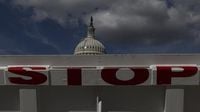In a move that’s sending ripples through the world of higher education, the Trump administration has issued a sweeping proposal to nine of the nation’s most prominent universities, asking them to sign on to a controversial set of political and ideological commitments in exchange for enhanced access to federal funding. The initiative, dubbed the "Compact for Academic Excellence in Higher Education," was first circulated on Wednesday, October 1, 2025, and has since ignited a fierce debate over academic freedom, campus diversity, and the role of government in shaping university policy.
The 10-page compact, as reported by the Associated Press and confirmed by outlets including Reuters, Newsweek, and The Wall Street Journal, was sent to Vanderbilt University, Dartmouth College, the University of Pennsylvania, the University of Southern California, Massachusetts Institute of Technology (MIT), the University of Texas at Austin, the University of Arizona, Brown University, and the University of Virginia. These universities, some of the most selective public and private institutions in the country, were asked to make a decision by November 21, 2025, and to provide feedback before the language is finalized.
The proposal marks a notable shift in the administration’s approach. Instead of simply threatening to cut funds, as it has in the past with institutions like Harvard and Columbia, the White House now offers what it calls "multiple positive benefits"—including substantial federal grants and increased overhead payments—for schools willing to adopt its priorities. According to the letter sent alongside the compact, universities that sign on could expect "substantial and meaningful federal grants" and "increased overhead payments where feasible."
But what exactly are the strings attached? The compact lays out a detailed list of demands. Universities would be required to accept the government’s definition of gender and apply it to campus bathrooms, locker rooms, and women’s sports teams. They must also eliminate consideration of race, gender, and a wide range of student demographics in admissions, instead requiring all undergraduate applicants to take the SAT or ACT standardized tests. The memo further bans the use of race or sex in hiring and admissions decisions, as reported by Reuters and Newsweek.
International enrollment is also under the microscope. The compact caps international undergraduate enrollment at 15 percent, with no more than 5 percent from any single country. According to federal data cited by the Associated Press, Dartmouth and USC are just below this threshold at 14 percent, while most other universities fall within the cap. Schools already above the limit would be expected to meet it in future incoming classes.
On the financial front, the compact calls for a five-year tuition freeze for U.S. students. Furthermore, universities with endowments exceeding $2 million per undergraduate would be barred from charging tuition at all for students pursuing "hard science" programs. The memo also urges schools to reduce administrative costs, aiming to make higher education more affordable and accessible.
Perhaps the most contentious elements center on campus culture and free speech. The compact insists that universities foster a "vibrant marketplace of ideas" where no single ideology dominates. It specifically requires the transformation or abolition of departments and units that "purposefully punish, belittle, and even spark violence against conservative ideas." In addition, employees would be barred from expressing political views on behalf of their employer, and universities would be obligated to prevent disruptions to classes or campus libraries, ensuring demonstrators do not heckle other students.
To enforce these provisions, the compact would require signatory schools to hire independent auditors who would anonymously poll students, faculty, and staff to evaluate adherence to the agreement. The results would be made public and reviewed by the Department of Justice. Violators would lose access to the compact’s benefits for at least a year, with repeated violations resulting in a two-year penalty.
Reactions from university leaders and public officials have been swift and sharply divided. Kevin Eltife, chairman of the University of Texas System Board of Regents, welcomed the opportunity, stating, "Today we welcome the new opportunity presented to us and we look forward to working with the Trump Administration on it." The University of Virginia’s interim president quickly assembled a working group to review the proposal, while the University of Southern California and MIT confirmed receipt of the document and are currently reviewing it.
However, many in academia and beyond see the compact as a threat to core values of higher education. Ted Mitchell, president of the American Council on Education, was blunt in his assessment: "Who decides if the intellectual environment is vigorous and open-ended? This is not something the federal government should be involved in and adjudicating." He also warned, "It’s not worth the compromises that they would have to make. This is a Faustian bargain." According to The Wall Street Journal, Mitchell described the implications for free speech as "horrifying." Larry Summers, former Treasury secretary and Harvard president, echoed these concerns, calling the compact "ill conceived and counterproductive," and warning that "the backlash against its crudity will likely set back necessary reform efforts."
State officials have also weighed in. California Governor Gavin Newsom was unequivocal, declaring on X, "IF ANY CALIFORNIA UNIVERSITY SIGNS THIS RADICAL AGREEMENT, THEY'LL LOSE BILLIONS IN STATE FUNDING — INCLUDING CAL GRANTS — INSTANTLY. CALIFORNIA WILL NOT BANKROLL SCHOOLS THAT SELL OUT THEIR STUDENTS, PROFESSORS, RESEARCHERS, AND SURRENDER ACADEMIC FREEDOM." Newsom’s stance puts institutions like the University of Southern California in a difficult position, essentially forcing them to choose between federal and state support.
Rights advocates and faculty associations have raised additional alarms. The compact’s requirement that universities share information about foreign students with federal agencies has sparked privacy and due process concerns, especially in light of recent deportation attempts involving international students engaged in pro-Palestinian activism. Critics argue that screening applicants for "alignment with American and Western values" could further undermine the open exchange of ideas that defines American higher education.
Meanwhile, the Trump administration has defended the initiative as a necessary corrective to what it perceives as a pervasive liberal bias and hostility to conservative viewpoints on campus. May Mailman, a senior adviser at the White House, told Newsweek that the administration is not planning to limit federal funding only to schools that sign the compact, but those that do would be prioritized for grants when possible. She added that the schools were chosen for their reputations as "good actors," with leadership seen as open to reform and higher-quality education.
This latest move follows a pattern of escalating federal involvement in university affairs. In recent years, the administration has frozen funding for Harvard and other schools over allegations ranging from antisemitism to concerns about diversity practices. Columbia and Brown universities have already reached multimillion-dollar settlements with the government to restore funding, and a deal with Harvard reportedly involving $500 million was said to be close as of early October 2025.
As the November 21 deadline approaches, the nine universities face a stark choice: accept the administration’s terms and gain access to a new stream of federal support, or reject the compact and risk losing out on critical funding—potentially even facing state-level penalties. The outcome will likely shape not only the future of these institutions but also the broader debate over the balance between institutional autonomy, federal oversight, and the free exchange of ideas on America’s campuses.
With so much at stake, all eyes are now on the universities’ next moves—and on the national conversation about what higher education in the United States should stand for in the years ahead.






